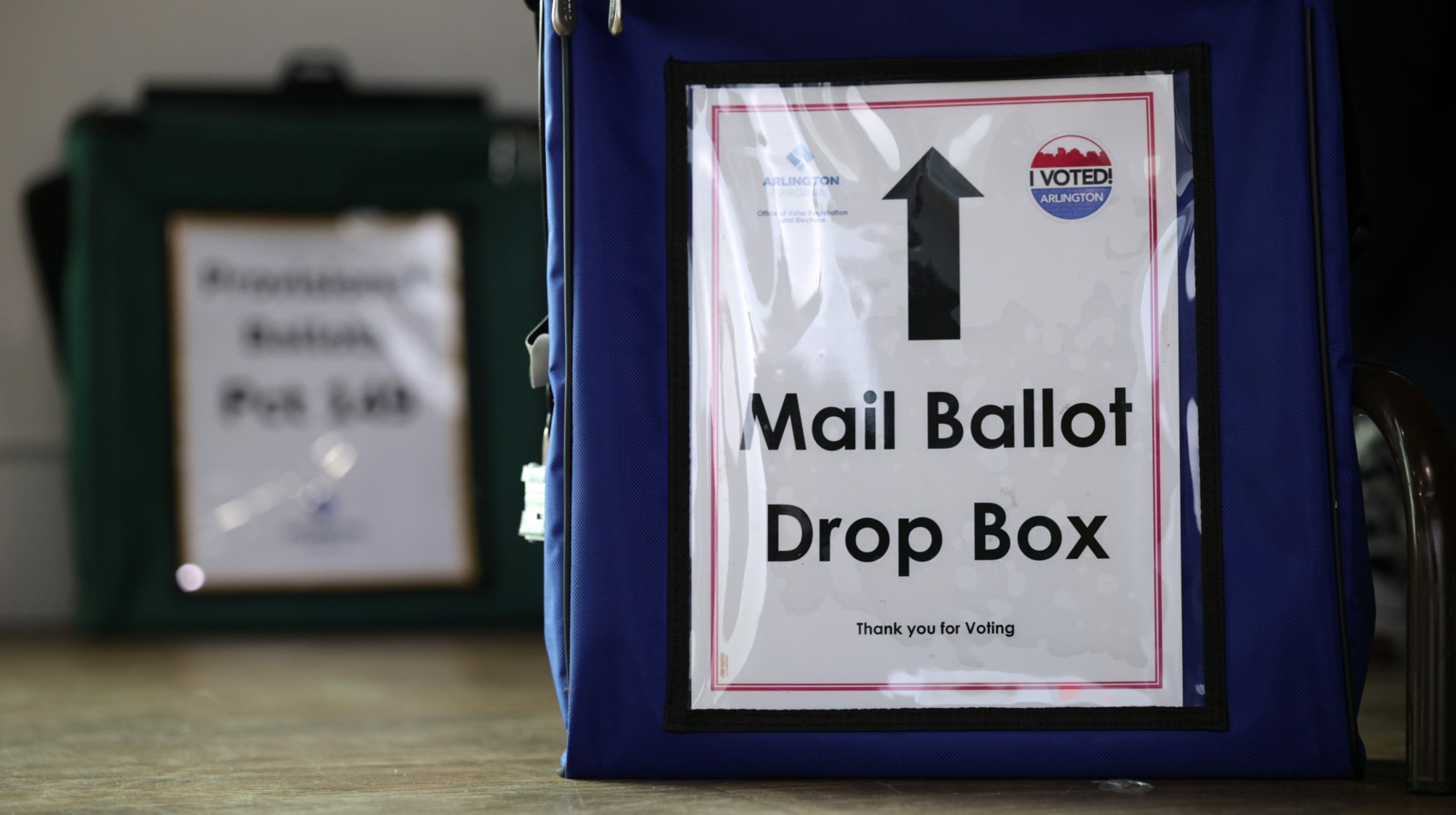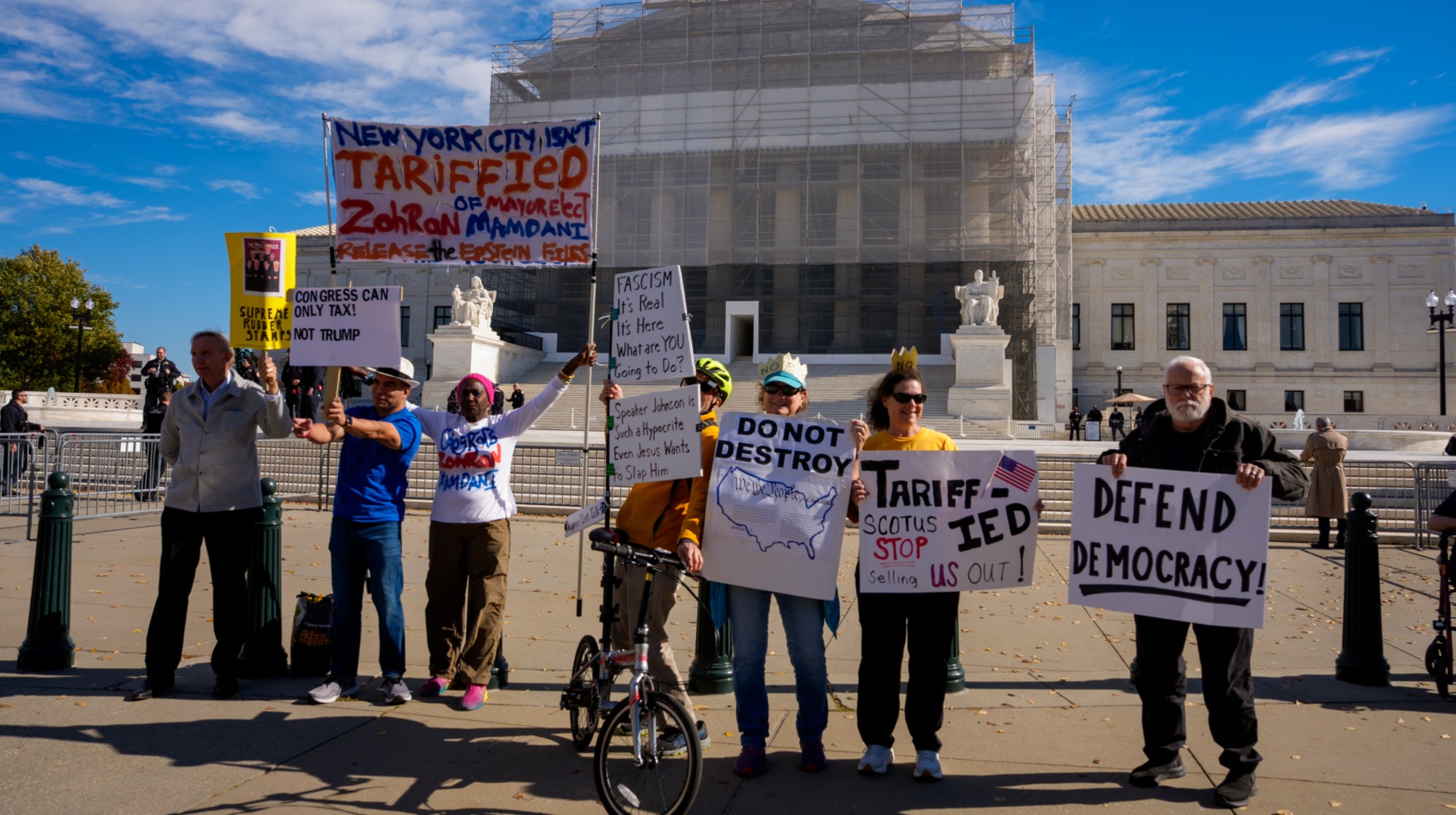The GOP's long assault on voting rights
A decades-long campaign to control the courts has succeeded in giving red states a license to discriminate


A free daily email with the biggest news stories of the day – and the best features from TheWeek.com
You are now subscribed
Your newsletter sign-up was successful
On Thursday, the Supreme Court closed out its latest term with another blow to the already weakened Voting Rights Act, showing once again that the burdens placed on Black voters in America will continue to be a struggle that only Congress can correct. In a second party-line decision, the court's conservatives made it easier for wealthy corporations to hide their political contributions.
Together, the cases were a reminder that, as much as folks tend to fault former President Donald Trump for the corrosion of American democracy, making it harder for people of color to vote and helping corporations control elections with money are Republican Party projects that long predate him. It's one of the reasons why many of the recent media warnings about the fall of American democracy seem much-belated. If an entire political party is openly pursuing a strategy of denying Black folks the right to vote, how healthy of a democracy do we have? It's also another ominous signal of how successful the GOP's efforts to remake the judiciary have been.
In Thursday's first decision, the court upheld two laws passed by Arizona's GOP-controlled legislature. The first prevents anyone but a voter's family member or caregiver from returning a mail-in ballot, which former President Donald Trump sinisterly described as "ballot harvesting," while the other throws out votes cast in the wrong precinct. These laws had been struck down by the Ninth Circuit Court of Appeals in January 2020 for having a "discriminatory impact" against Black, Native American, and Latino voters. George W. Bush-appointee Justice Samuel Alito argued for the conservative majority that the state's interest in the integrity of elections justified the measures, no bother if the cited concerns about voter fraud are based in fantasy or if the legislature admitted its motives were political.
The Week
Escape your echo chamber. Get the facts behind the news, plus analysis from multiple perspectives.

Sign up for The Week's Free Newsletters
From our morning news briefing to a weekly Good News Newsletter, get the best of The Week delivered directly to your inbox.
From our morning news briefing to a weekly Good News Newsletter, get the best of The Week delivered directly to your inbox.
In dissent, Justice Elena Kagan lamented that the court's conservatives were weakening the landmark voting rights law for the second time in eight years. "What is tragic here is that the Court has (yet again) rewritten — in order to weaken — a statute that stands as a monument to America's greatness, and protects against its basest impulses."
As noted by the Associated Press, criticism of the laws included the fact that "Native Americans who have to travel long distances to put their ballots in the mail were more likely to be affected by the ballot collection law." Moreover, the appeals court found that "votes cast by Black and Hispanic voters were more likely to be tossed out because they were cast in the wrong precinct."
Yet Alito is a fan of discriminatory laws of this sort. He wrote the majority opinion in 2018's Husted v. A. Philip Randolph Institute, which involved a challenge to Ohio's attempts to purge residents from the voter rolls on the basis of infrequent voting. As reported at the time, in three years, GOP state officials managed to purge nearly 1.2 million voters who were disproportionately likely to be nonwhite. In that decision, Alito's sympathy went towards the state, framing the case as an unfair attack by a "pair of advocacy groups" on Ohio officials. He took a similar stance later that year in Abbott v. Perez, when he ignored evidence that Texas lawmakers were purposely seeking to dilute votes.
It's no wonder he said the measures enacted in Arizona were at most "modest burdens" that did not violate the law, presumably letting out a heartless chuckle afterwards.
A free daily email with the biggest news stories of the day – and the best features from TheWeek.com
Meanwhile, in the second decision issued Thursday, the court ruled California may not require charities and non-profit advocacy organizations soliciting contributions in the state to report the identities of their major donors. The vote, as before, was 6 to 3, with another Bush appointee, Chief Justice John Roberts, writing the opinion and the court's three liberal members in dissent. So again: It's okay if it's more difficult to vote if you're not white; if you're a major corporation, though, you can buy elections with greater discretion.
Chief Justice Roberts' record on these matters is no less vile than Trump's. He has spent his entire career trying to destroy the VRA. In 2013, when he authored the majority ruling in Shelby County v. Holder that first gutted the Act, Roberts wrote "things have changed dramatically" in the South, suggesting that institutional racism is no longer a concern. Like Alito, his reasoning relies on denying what is right in front of his face.
As with Shelby County, which paved the way for a wave of new voting restrictions in GOP-controlled states, the Arizona ruling's ramifications will extend well beyond the state. According to the Brennan Center for Justice, 17 states have passed 28 new laws this year restricting access to the ballot. Democrats have filed lawsuits to block many of them, but if this court follows Alito's conclusions, one imagines any future cases heard by the court will only further damage the VRA.
As Mother Jones' Ari Berman writes: "The decision on Thursday signals that a conservative-dominated judiciary — which includes three Supreme Court justices nominated by Donald Trump — will not stand in the way of the greatest rollback of voting rights since the end of Reconstruction."
Republicans have prioritized flooding the judiciary with as many ideologues as possible for longer than I've been alive. They don't care about the will of the people; power is their only motive and they exploit every measure necessary to maintain it. Trump may not have been in on the decades-long planning to have a conservative majority of the Supreme Court in order to do things like gut the VRA, but he provided the numbers to finally complete the job.
This will extend to other issues soon enough. Next term, the court has agreed to hear an abortion case that could decimate reproductive rights and a battle over open-carry gun laws, with decisions expected in June 2022. Are you ready for interstate travel for abortions, weapons being wielded on every corner, and whatever else reminds you of Gotham City in its worst shape without helpful rich viglantes?
Now would be the time for Democrats to get serious. They need to pass voting rights and campaign finance legislation, to be sure. But at some point, the Biden administration must confront the reality that unless they reimagine the current makeup of the Supreme Court, anything Democrats hope to achieve might be struck down. For the sake of the rest of us, I hope they learn fast.
Michael Arceneaux is the New York Times-bestselling author of I Can't Date Jesus and I Don't Want to Die Poor.
-
 The Week Unwrapped: Have televised confessions quelled protests in Iran?
The Week Unwrapped: Have televised confessions quelled protests in Iran?Podcast Plus, why has Elon Musk turned from Mars to the Moon? And will the BBC prove to be a puzzles champ?
-
 The week’s best photos
The week’s best photosIn Pictures An Andean god, a rogue squirrel, and more
-
 9 products to jazz up your letters and cards
9 products to jazz up your letters and cardsThe Week Recommends Get the write stuff
-
 Supreme Court upholds California gerrymander
Supreme Court upholds California gerrymanderSpeed Read The emergency docket order had no dissents from the court
-
 The billionaires’ wealth tax: a catastrophe for California?
The billionaires’ wealth tax: a catastrophe for California?Talking Point Peter Thiel and Larry Page preparing to change state residency
-
 How robust is the rule of law in the US?
How robust is the rule of law in the US?TODAY’S BIG QUESTION John Roberts says the Constitution is ‘unshaken,’ but tensions loom at the Supreme Court
-
 Bari Weiss’ ‘60 Minutes’ scandal is about more than one report
Bari Weiss’ ‘60 Minutes’ scandal is about more than one reportIN THE SPOTLIGHT By blocking an approved segment on a controversial prison holding US deportees in El Salvador, the editor-in-chief of CBS News has become the main story
-
 The ‘Kavanaugh stop’
The ‘Kavanaugh stop’Feature Activists say a Supreme Court ruling has given federal agents a green light to racially profile Latinos
-
 Supreme Court to decide on mail-in ballot limits
Supreme Court to decide on mail-in ballot limitsSpeed Read The court will determine whether states can count mail-in ballots received after Election Day
-
 Trump tariffs face stiff scrutiny at Supreme Court
Trump tariffs face stiff scrutiny at Supreme CourtSpeed Read Even some of the Court’s conservative justices appeared skeptical
-
 Has Zohran Mamdani shown the Democrats how to win again?
Has Zohran Mamdani shown the Democrats how to win again?Today’s Big Question New York City mayoral election touted as victory for left-wing populists but moderate centrist wins elsewhere present more complex path for Democratic Party
